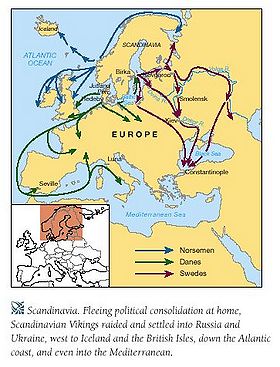Viking
| Part of the series on |
| The Middle Ages |
| Historical Periods |
|
Early Middle Ages (6th-10th century) |
| Medieval History |
|
Holy Roman Empire |
| Medieval Society |
Viking is the name used for the warrior/trader people of Scandinavia (Norway, Sweden, and Denmark) from about A.D. 750 to 1050.
Raids
In their own culture, the word "viking" referred only to their pillaging raids on other people, usually carried out by sea in distinctive boats that were advanced for their time. These raids were famously devastating, and had a major impact on the history of Britain and France. The spread of Christianity through the British Isles had led to the building of many large and wealthy monasteries which were attractive and easy targets for Viking raids. The contemporary Anglo-Saxon Chronicle describes the first Viking raid on the coast of Britain, at the monastery at Lindisfarne Abbey in A.D. 793, and gives a clear impression of how the local inhabitants were caught unawares and did not know how at first to respond to the approaching longships:
"...there came for the first time three ships; and then the reeve rode there and wanted to compel [the Vikings] to go to the king's town, because he did not know what they were; and they killed him. Those were the first ships of the Danish men which sought out the land of the English race."
The chronicle goes on to describe the ferocity of the raid, which was greeted with shock throughout the Christian world:
"...wrecking, robbing, shattering and killing not only animals but priests, monks and nuns... [The raiders] slayed everything alive, dug up the altars and took all the treasures of the holy church..."
Exploration
Along with their destructive habits, Vikings were also well-known traders, explorers and settlers. They settled the islands of Iceland (870), Greenland (985) and briefly Newfoundland (around 1000), establishing a colony called Vinland nearly five centuries before Columbus. They founded the city of Dublin, Ireland, as a trading center. Vikings also expanded toward the East. They were involved in the founding of Russia, and were important in the history of the Eastern Roman Empire at Constantinople.
At home, Vikings were industrious farmers and fishermen. They had a distinctive culture that valued honor, hospitality, and generosity.
Religion
Vikings had a polytheistic society. They had many gods, such as Tyr, Odin, Thor, and Freya. Stories about these gods are now called Norse Myths. Many Vikings violently opposed Christianity, but for the most part eventually succumbed to it through persuasion, example and use of force[1].
Vikings who are still famous in our time are Eric the Red, discoverer of Greenland, and his son Leif Ericson, the first known European to land in North America.
Further reading
- Brøndsted, Johannes. The Vikings (1965) online edition
- Haywood, John. The Penguin Historical Atlas of the Vikings (1995) excerpt and text search
- Jones, Gwyn. A History of the Vikings (2001) excerpt and text search
- Roesdahl, Else. The Vikings (2nd ed. 1999) excerpt and text search
- Sawyer, Peter. The Oxford Illustrated History of the Vikings (2001) excerpt and text search
